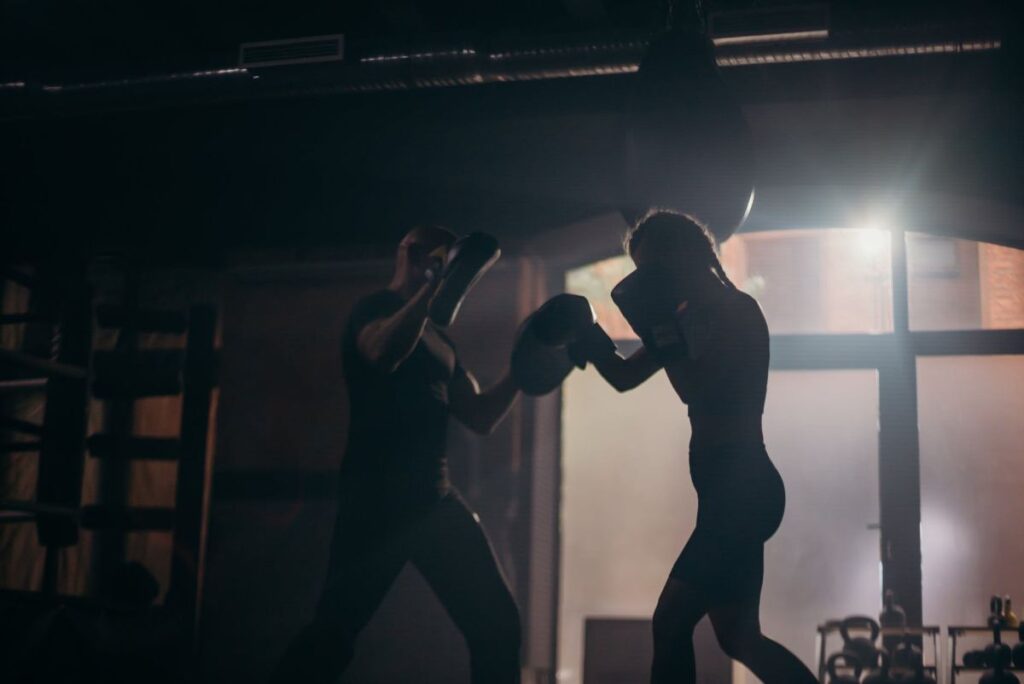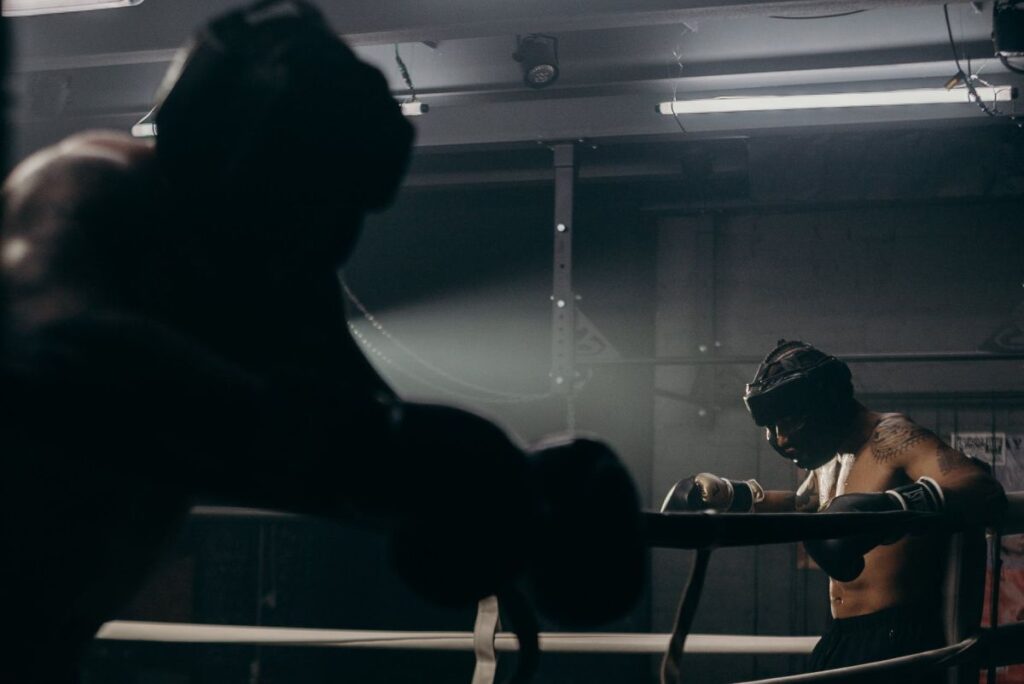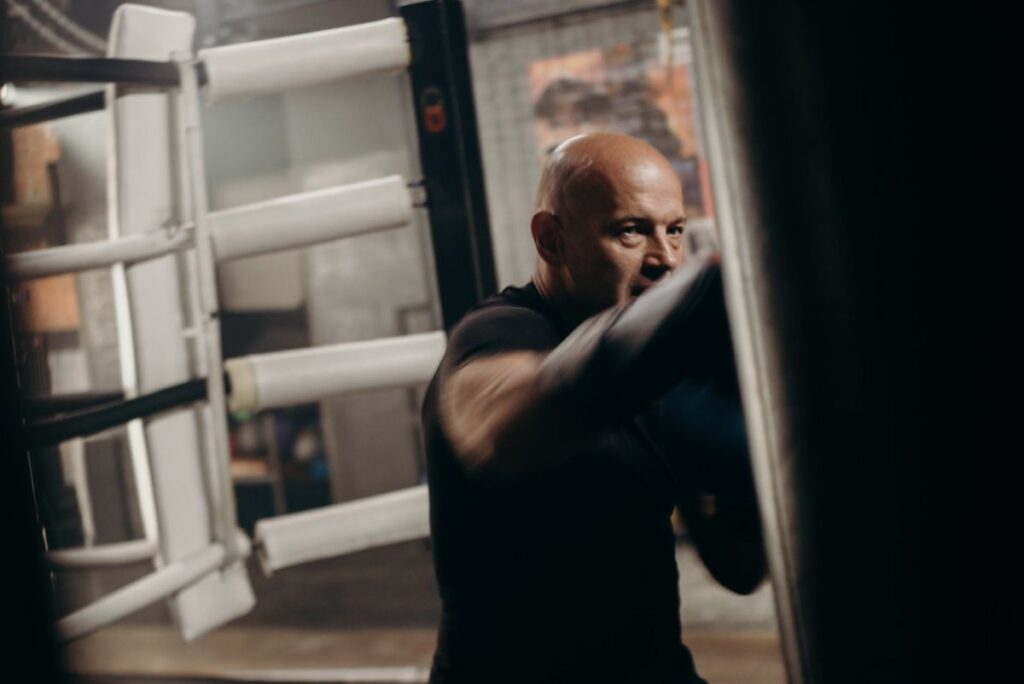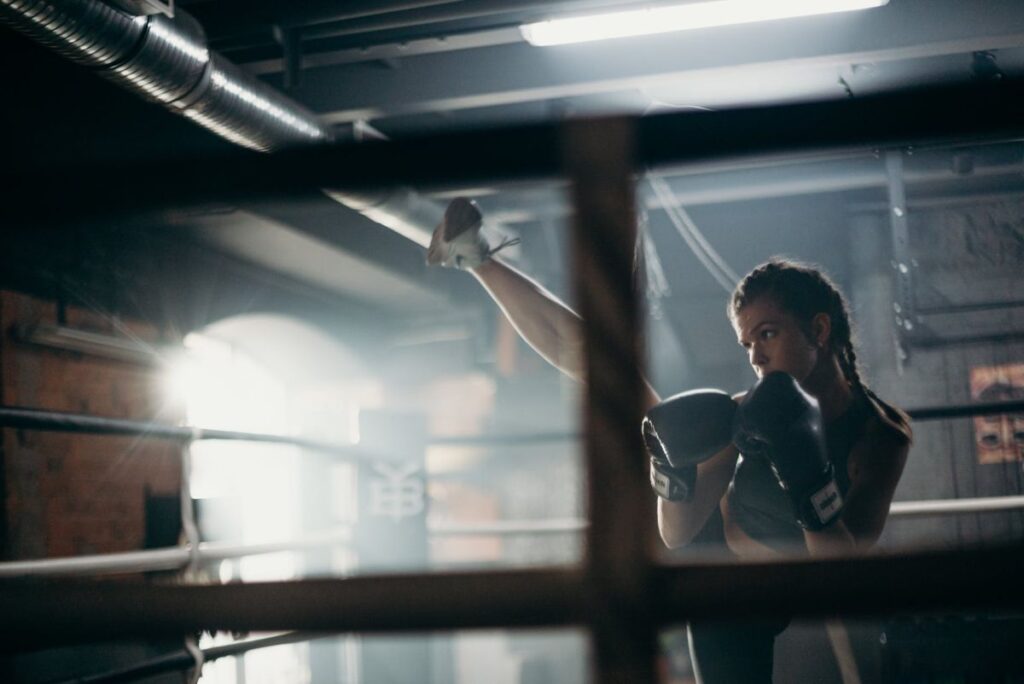As boxing appears to be a simple sport, it involves much more than merely punching one another. It demands good footwork, balance, endurance, strength, and coordinated punches in boxing. Additionally, it is primarily about defence rather than just attacking the opposition.
You should therefore exercise both your body and your intellect. But you can achieve good results with the appropriate exercises and persistent practice.
Here are some essential boxing pointers for newcomers to our boxing gyms.
1. Throw light but sharp punches
Beginners make the regrettable error of wanting to strike the bag hard.
It seems OK to use the strength of your arm and shoulder muscles to punch with power, but you need actually to use your entire body to throw the punch. You'll be able to strike much bigger that way. Your body should be at ease for this. Punt as your muscles are contracted and as they start to relax. You'll notice the distinction.
Also, if every punch you throw is at its highest level, you won't have the energy to train for very long. You won't have enough time to train for boxing. After a minute, you'll be out of breath, which is useless.
2. Shorter combos
There is no need to perform intricate boxing maneuvers at this stage in your training. 3–4 punch combinations will do. More punches can be added to your combos as you improve. It is preferable to perform a smaller number of combination types well than a large number of poor ones.
3. Enough water intake
Drink plenty of water, whether sparring with a competitor or hitting the bag at home. Since a great boxing workout is difficult and you sweat a lot, you need to rehydrate yourself. You won't be able to train if you are dehydrated.
4. Learn, learn, learn
If you go to a boxing gym, get in touch with others, and ask for advice. Watch how the best boxers train and “steal” their best movements. Also, there are tons of materials online from which you can learn. The more tricks and techniques you know, the better since you will see and understand your weaknesses. But the internet is also full of boxing training tips.
5. Correct breathing technique
Hold your breath, but don't! Don't forget to breathe out before you punch. The proper breathing technique is essential to have the energy for the entire workout when boxing. You can also take the body shots coming at you better. Tell your coach if you are completely out of breath so you can take a moment to collect yourself.
6. Keep your head up
While sparring or punching the bag, many beginners fix their eyes on the ground. Big error! If you can't see your opponent, how do you know where he is and what he's doing?
7. Get more challenging workouts gradually
As with all other sports, you should begin carefully and build up the quantity and intensity of your boxing training over time. If you push yourself to the limit right away, you will quickly become physically and mentally exhausted. It will take some time for your body and mind to adjust to this kind of exercise. Do you truly wish to quit after a month?
8. Proper boxing stance
Always maintain the appropriate boxing stances, whether sparring with someone or hitting the punching bag. You'll be able to hit harder and support the defence in this state. Moreover, it improves balance, mobility, flexibility, and strength.
9. Hands high and elbows down
Fighters can be seen lowering their arms during a boxing battle, but since you are just starting out, you shouldn't do it just yet. Always keep your elbows tight to your body and your hands high. Even if you punch a heavy bag, stay in this position. Keep your chin down as well.
10. Keep hitting
No matter what, continue striking, whether sparring or punching a heavy bag. Your opponent ought to be aware that you are not quieter.
11. Be focused
There is no time to drift off in the ring. When you are not focused on being knocked out, your opponent waits for that split second. When you strike the bag, pretend you are engaged in a physical altercation and focus as though you are.
12. Throw body punches
Don't just practice striking your head. Significant are body shots. Attack your player's body from every direction. As it is said,
13. Keep your opponent wondering what your next punch will be
If you consistently use the same blows and combos, your adversary will rapidly learn how to defend himself and identify your weak points. Keep them guessing, then. In this sense, he will eventually become mentally fatigued and lose concentration.
14. Footwork
For both attacking and defensive purposes, good footwork is necessary. It is just as crucial as knowing how to punch properly. Always move while maintaining the appropriate boxing posture when sparring or working out on a heavy bag. Have you ever noticed combatants standing in front of one another during a who bout? Well, you haven't. It is an essential boxing move.
Here are some practical boxing footwork suggestions.
15. Have fun
I've tried a lot of sports throughout my life, but none of them excite me as much as boxing does. Although I am aware that I will never be a fighter, this activity has allowed me to decompress and improve my endurance. As with everything else, don't take it too seriously unless you want to be the next Tyson. Of course, you should work hard while exercising, but avoid making it monotonous.
16. Essential boxing equipment for home
You don't even need any equipment to master the fundamentals. I mean, you begin with shadowboxing to become adapted to your technique, footwork, and punches. The best approach to acclimatize to martial art is in that manner. Running, jumping rope, and bodyweight workouts (pushups, situps, and pullups) are all good for conditioning.
Getting boxing gear is the following step. Use a heavy-hanging or free-standing bag for boxing drills and punching power development. The speed bag or double-end bag, which assists with hand-eye coordination, hand speed, rhythm, and other offensive and defensive boxing skills, are additional punching bag kinds that are worthwhile taking into account. Punching bags are available in a variety of types, but most are designed for experienced boxers.
It would be best if you also bought gloves and hand wraps to protect your hands.
17. Always wear boxing gloves
Always wear gloves and wrap your hands before hitting the bag since the joints and tiny bones in your hands and wrist are extremely fragile and easily broken by powerful hits. This is vital if you engage in a boxing workout to increase your punching power. Regardless of the type of workout I undertake, I always wear gloves since that is how it is done in the boxing ring.
18. Get a boxing coach
Most of us practice boxing to improve our physical condition or boost our confidence; not everyone practices to become the next Mike Tyson. Getting a membership to a boxing gym where you can learn the fundamentals and get motivated by others is the greatest method to learn how to box. There are a ton of resources online where you can learn and obtain boxing tips if you can't afford to join a gym. One excellent site where Johnny provides excellent free tutorials for beginning boxers is expertboxing.com.
These are only a handful of beginner boxing pointers, yet they may be the most crucial ones. You will acquire more specialized technical skills as you grow physically and cognitively and as the various techniques become second nature. Just bear in mind that practising is as essential in boxing as it is in any other sport. You may read evaluations of at-home workout clothes on this website if you desire to train at home.
5 Tips To Go From Good To Great In Boxing
Perhaps you have been spending thousands of hours in the boxing gym, and in addition to mastering the foundations and the basics, you have also developed into a superb boxer. However, a thin line separates good boxers from great boxers in this martial art. You will need to change your strategy if crossing that barrier is something you want to do.
The sport of boxing has existed since the dawn of humankind. Through the years, people have practised "The Sweet Science." Over that time, methods and strategies have also been improved. Unimaginable knowledge can be gained while training in this field, and there is a lot of material to cover.
There are some areas of your game that you should be concentrating on if you want to improve as a boxer. These are skills that, even as a beginner, if developed early in training, can significantly improve your performance as you get more expertise.
Every boxer seeks to reach the next level when they advance from understanding the fundamentals to being able to read their opponents and successfully use their skills to employ fight-winning tactics. Here are a few ideas to keep in mind if you want to bridge that razor-thin border between good and outstanding.
1) Focus on technique, not power
Although there will be knockouts, as a beginner in this sport, your major priority should be to improve your technique. By using perfect skill, you can make sure that every punch has its full potential.
Everyone who does martial arts will tell you that there is always room for improvement. The technique is the most crucial aspect of your boxer improvement, whether shortening your punches or better selling your feints.
Too many newcomers waste energy by concentrating on gaining strength or trying to punch as hard as possible. You burn more energy and make every motion count by emphasizing technique over strength.
2) Pick your spots
Make sure every action you take has a reason; don't just throw your combos for fun.
There should be no unnecessary movement in boxing. Every action you make, including punches, should be meaningful. Try to choose your positions more wisely in this case.
Search for any gaps that might open up during a conflict. Utilize your jab to maintain constant engagement with your opponents, then come at them with your power strikes when they let their guard down. Feints are a fantastic technique that advanced boxers adore using because they don't need much energy yet are really effective at creating openings.
You will almost always be far more effective than your competitor in terms of punching accuracy and energy consumption if you use your offensive and defensive output wisely.
3) Try not to get hit
To hit and avoid getting hit is the object of the game. Beginner boxers much too regularly overlook this extremely simple idea.
Many boxers, especially beginners, have a tendency to forget that boxing involves a significant amount of defence. You don't want to endure too much punishment or excessive head trauma. Your vitality and stamina are drained by each blow you take, making you move more slowly.
Landing your combinations while taking the least damage should always be your main goal. Boxing is known as "The Sweet Science" for a reason. Every action is the result of extensive technique.
Develop your defence skills and incorporate them into your offence to create a fluid fighting style..
4) Study your opponents beforehand
There's a solid reason why a boxing match is frequently likened to a chess game. Knowing your enemy and paying close attention to the mannerisms and habits he or she adopts are important components of the strategy. This enables you to spot opportunities and seize them.
If videos are available, you can watch them to learn more about your rivals, or you can listen to scouting reports often made by your trainers.
Early in your career, you might just have a vague idea of your opponent's style, and there might not be a tape to watch. These situations involve a mid-fight style analysis of an adversary.
As a result, your coach's advice in the corner between rounds is essential to winning. In boxing, the fighter who executes the finest mid-fight adjustments frequently ends up pulling away in favour of victory at the conclusion.
5) Listen to your coaches
Coaches are far more knowledgeable about boxing than you are. Your education and growth as a warrior depends on you learning from and applying the knowledge they have stored in your thoughts.
In all levels of training, you should be listening to your trainers, striving to absorb their years of knowledge to the best of your ability. They are fully capable of transforming you into your full potential.
In order to learn as a martial artist, humility is essential. Be humble enough to listen to your coaches' advice and try your best to put it into practice if you want to reach your full potential. You'll definitely become a great boxer in the future if you maintain your humility and use their technical expertise in your sparring.
You're almost certain to succeed if you and your coach continue to get along well. Half of the battle is won there. The other half is dedication and hard effort.
Beginners Boxing Tips
It's OK if your first visit to your neighbourhood boxing gym seems a little daunting. I distinctly recall wondering about the exercises we would be performing, if the trainers and other boxers would be cordial, how I would rank among my classmates, and a thousand other unrelated questions. Fortunately, it ended up being one of my all-time favourite athletic events! I've been practising for a while now. I'm happy to share a few of my own insights with other newbies to help boost your self-assurance as you enter your first training session. Before beginning the sport, make sure to read the beginner's boxing advice included below. Be sure to check back often because the beginner's guide will be updated as and when we have new advice to share.
The tips in the list below may seem a bit lengthy, but I assure you that they are all ones I have personally learned through my experience in combat sports, as well as through outside research and asking professional boxing coaches for their recommendations on how to have the most enjoyable, efficient, and beneficial training sessions.
1. Find the right gym
When first starting the sport, it should be a top priority to find a boxing gym that is warm, and welcoming, has adequate equipment, amenities (water fountains, showers, toilets, air conditioning, etc.), and properly licensed and highly experienced coaches.
In addition to helping you progress more quickly, having qualified instructors actively teach you is crucial to lowering the chance of harm. When it comes to common injuries, a skilled coach will have seen it all and can advise you on form, technique, workouts, and equipment to keep you fighting fit all year long. However, as with any combat sport, accidents do arise. Therefore having someone prepared to handle these situations is a great advantage.
2. Invest in quality equipment
Similar to the last point, investing in high-quality equipment can make your training sessions more efficient, safe, and enjoyable. You may reduce your chance of injury and make maintaining perfect form and technique that much simpler by bringing the appropriate combination of boxing gloves, hand wraps, mouth guards, and equipment to the gym. If you haven't bought your own yet, remember that most high-quality boxing gyms will have extra equipment. If you are unclear about what to buy or what you need, visit a nearby gym that is licensed and ask to use their equipment for a session before deciding to get your own.
Though the best boxing equipment can vary depending on your objectives, size, age, strength, and experience, you should conduct your homework before making any purchases. We suggest starting with our professional buyer's guides to get an idea of the possibilities available and the circumstances in which they could be appropriate.
3. Read up on/study some best practices and techniques before training
Why not surf YouTube, conduct a Google search, or simply watch a boxing match to understand some best practices, techniques, and strategies? This can give you a general concept of where to throw your jabs and how to position your body for a stronger uppercut, but it by no means replaces working out in the gym or hitting the bag. Of course, this should be covered when you first begin your training, but there is still good, cost-free information online!
4. Stay light on your feet
Ali wasn't joking when he said, "Float like a butterfly." A fundamental component of being a successful boxer is being quick on your feet. By doing this, you maintain rapid reflexes and punches. Moreover, having swift head movements can quickly counterbalance being light on your feet. You'll be better able to slip counterpunches as a result.
5. Stay calm
Many beginner fighters incorrectly believe they must bring or channel their aggression into the ring. This is risky thinking since hostility breeds carelessness and overconfidence in your offensive and defensive abilities. The outcome of a fight can be determined by one powerful blow to the opponent. Thus, part of your training will involve developing the ability to maintain composure both inside and outside the ring.
6. Control your breathing
You will easily pass out if you can't control your breathing. You should be sharply exhaling every time you throw a punch, as well as occasionally (when necessary), when using energy to block, slip, dodge, or duck another person's punch.
7. Perfect your combinations
It would help if you strived to improve your combinations when using the heavy bag, playing on the speed bag, and working on your pad skills. You will rely heavily on muscle memory during a competitive fight or rigorous sparring. The easiest way to ensure you create this muscle memory is to strike the heavy bag in different combinations repeatedly.
8. Do your stretches
As with any exercise regimen, stretch after each session. A proper cool-down will help you avoid injuries, speed up recovery, and leave you feeling peaceful and fresh. When stretching, concentrate on the important muscle groups (legs, back, chest, etc.), and be sure to keep your breathing under control.
9. Mix it up
Make sure you don't rely on your strongest punches to win an argument (or any punch or combination). A variety of motions, punches, and combos should be used. When jabbing high or throwing hooks to the body, drop your knee(s).
10. Perfect moving whilst keeping your boxing stance
It would be best if you practised moving around the ring while maintaining a firm boxing stance, whether you are an orthodox or a southpaw. Losing your stance makes it simple to fall off balance, while staying planted makes it possible to attack with more force and speed.
11. Do not forget the defence
Numerous amateur boxers disregard their defensive techniques in favour of throwing their powerful punches. Regular practice of ducking, slipping, blocking, and weaving can help you be ready for any punches your adversary may throw.
12. Work on your stamina
Be sure to take care of your body and nutrition starting today. Your boxing will improve as your endurance and stamina rise. Increases and improvements made here will enable you to work out more frequently and effectively.
13. Find a partner to practise counterpunches
You can intensify your workouts and training sessions by working out with a companion. You'll be able to practice your counterpunches, a crucial component of your boxing skill set, in addition to working up more of a sweat.
14. Always wash your hand wraps after training.
This one should go without saying, but it is nonetheless important to note. To avoid bacterial and odour buildup after training, you should always wash your boxing hand wraps (this will happen fast if you are working up a sweat in your training sessions).
Frequently Asked Questions
What are some common mistakes that beginners make in boxing?
Some common mistakes that beginners make in boxing include:
- Not keeping their hands up to protect their face.
- Leaning too far forward.
- Not rotating their hips when they punch.
- Not moving their feet enough.
What are some safety tips for boxing?
Some safety tips for boxing include:
- Always wear a mouthpiece and hand wrap when you box.
- Never spar with someone who is much bigger or stronger than you.
- Stop sparring if you are injured.
What are some beginner boxing drills?
Some basic boxing drills that beginners can do include shadowboxing, bag work, and footwork drills. Shadowboxing is a great way to practice your punches and footwork without a partner. Bag work is a great way to develop power and accuracy. Footwork drills can help you improve your balance and movement.
What are some resources for beginner boxers?
There are many resources available for beginner boxers, including:
- Boxing gyms
- Online instructional videos
- Books on boxing
- Boxing forums
What is the future of boxing?
The future of boxing is bright. Boxing is a popular sport that is growing in popularity around the world. Many talented boxers are coming up through the ranks, and the sport is sure to continue to be exciting for years to come.



